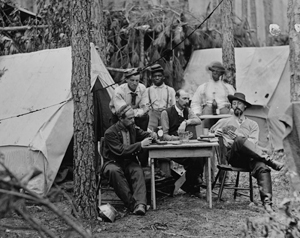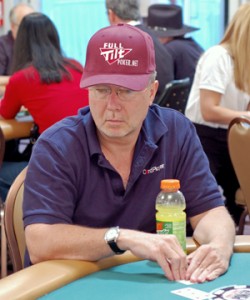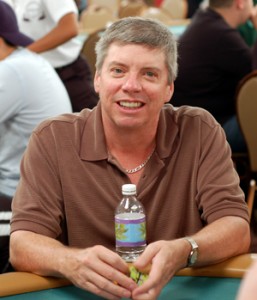This 2005 PokerPages article was inspired by a chat at a cocktail party. Poker was all the rage and people were curious about the way in which I made my living. While much has been written about the similarities between war and poker (as in David Apostolico’s Tournament Poker And The Art Of War), a Civil War buff at the party was intrigued about their shared need to exploit uncertainty. A little further Civil War study on my part yielded this article.
 As a new commander of the 21st Illinois Regiment, Ulysses S. Grant was about to enter a rebel camp.
As a new commander of the 21st Illinois Regiment, Ulysses S. Grant was about to enter a rebel camp.
“As we approached the brow of the hill from which it was expected we could see Harris’ camp, and possibly find his men ready formed to meet us, my heart kept getting higher and higher until it felt to me as though it was in my throat. I would have given anything to have been back in Illinois, but I had not the moral courage to halt and consider what to do; I kept on.”
Grant was about to learn a valuable lesson. A lesson the best poker players know by heart.
When the valley came into view, the enemy camp had been abandoned. “It occurred to me at once that Harris had been as much afraid of me as I had been of him. This was a view of the question I had never taken before; but it was one I never forgot afterwards. From that event to the close of the war, I never experienced trepidation upon confronting an enemy, though I always felt more or less anxiety. I never forgot that he had as much reason to fear my forces as I had his.”
Poker is a game of imperfect information. Good players hone their skill at gathering information; developing their card memory, observing tells and betting patterns, and gauging their opponents’ hand selection. Their goal is to decrease their level of uncertainty, to improve their comfort level and odds of survival when executing a hand.
But the very best players use the dearth of information as a weapon. Ambiguity is their ally. Uncertainty is their edge. Unless an opponent has the stone cold nuts, a pro knows they can exploit an opponent’s fear of the unknown. This is especially true in tournament poker, where survival is the underlying goal.
 In his November 26th article in the New York Times entitled, “Poker; To Survive or to Gather Chips, That Is the Question,” Jim McManus touches on this theme, highlighting the more aggressive style of the new breed of “chip gatherers,” exemplified by young tournament player, Erick Lindgren.
In his November 26th article in the New York Times entitled, “Poker; To Survive or to Gather Chips, That Is the Question,” Jim McManus touches on this theme, highlighting the more aggressive style of the new breed of “chip gatherers,” exemplified by young tournament player, Erick Lindgren.
In their new book, Kill Phil: The Fast Track to Success in No-Limit Hold ‘Em Poker Tournaments: Revised and Expanded Edition, Blair Rodman and Lee Nelson explore this theme in depth. While the book outlines a strategy for no limit hold’em tournament play, akin to Sklansky’s “System,” the true wisdom of their book lies in the discussion relative to uncertainty. Rodman and Nelson, like McManus, discuss the “new school” players; players that have a both a “high tolerance for ambiguity” and a total lack of fear.
 Tournament strategy has classically been described as finding a balance between aggression and survival. But as Rodman and Nelson point out, the new schoolers are shifting the fulcrum. And it’s not aggression for aggression’s sake. It’s all about exploiting uncertainty; playing a wider variety of starting hands, playing more hands, raising pre-flop, and betting post flop, all with the goal of increasing an opponents’ uncertainty and putting them on the defensive.
Tournament strategy has classically been described as finding a balance between aggression and survival. But as Rodman and Nelson point out, the new schoolers are shifting the fulcrum. And it’s not aggression for aggression’s sake. It’s all about exploiting uncertainty; playing a wider variety of starting hands, playing more hands, raising pre-flop, and betting post flop, all with the goal of increasing an opponents’ uncertainty and putting them on the defensive.
If a player holds two unpaired cards, the flop will miss them (not pair them) 68% of the time. A new school player is likely to bet the flop on the chance that their opponent has missed the flop or will fold with a marginal hand, regardless of what they, themselves, hold. A new school player will play on an opponent’s uncertainty and the situation more often than they will play their own cards.
In his attack against Fort Donaldson Grant said, “I was impatient to get to Fort Donaldson because I knew the importance of the place to the enemy and supposed he would reinforce it rapidly. I felt that 15,000 men on the 8th would be more effective than 50,000 a month later.” Grant knew his opponent was weak. He realized that his best chance was to try take the pot with a weak hand rather than to wait for a better one, when his opponent might be stronger and less uncertain.
As Grant quickly learned, once you realize the enemy is dealing with an equal level of uncertainty and fear, the only winning strategy is offense and aggression. After all, if you are willing to take the offensive, the only logical conclusion your opponent can reach is that you know more than he does.
George McClellan, one time commander in chief of the Union Army, never learned this lesson. He consistently overestimated opposing forces, always asked for reinforcements, and stalled an attack unless he felt he had an overwhelming advantage. Frustrated with McClellan’s unwillingness to engage the enemy, Abraham Lincoln relieved him from his command stating, “My dear McClellan: If you don’t want to use the Army I should like to borrow it for a while.”
Uncertainty: use it or lose it.
Pictures: Civil War soldiers playing cards from the Libary of Congress archives, Jim McManus and Blair Rodman at the 2007 WSOP.
3 Comments